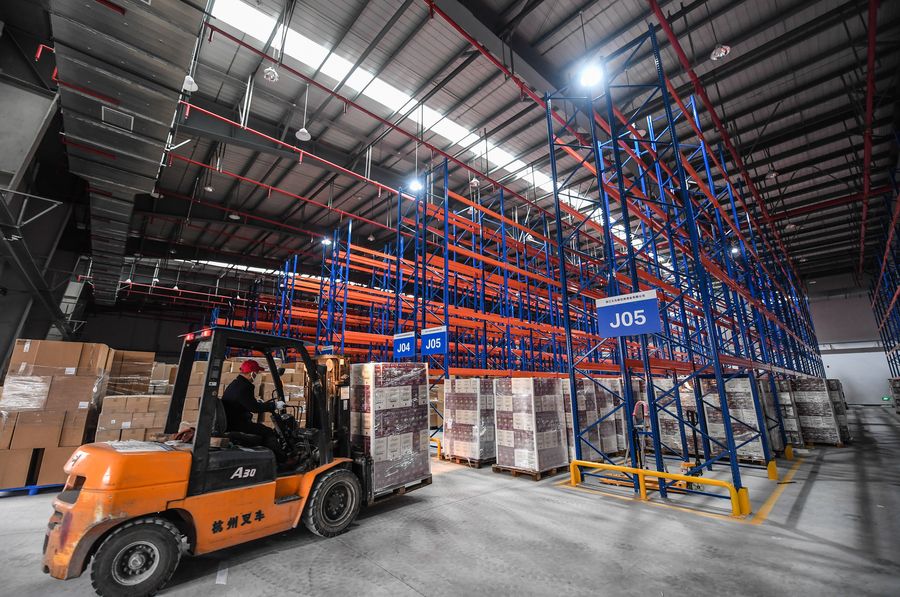
A worker unloads two containers of red wine imported from Europe at the Yiwu Bonded Logistics Center in Yiwu City, east China's Zhejiang Province, Dec. 20, 2019. (Xinhua/Xu Yu)
"We have no indication of our American companies, our members leaving China at all. Rather, many companies are increasing their investments in the country," said Craig Allen, president of the U.S.-China Business Council.
by Xiong Maoling
WASHINGTON, Feb. 20 (Xinhua) -- As the ongoing coronavirus (COVID-19) outbreak in China has sparked concerns for supply chain disruption, U.S. businesses and economists argued that large-scale supply chain shift is unlikely, stressing China's important role in global supply chain.
"I think in some sectors, companies are so dependent on China. There's no such thing as shifting the supply chain," Nicholas Lardy, senior fellow at the Washington D.C.-based Peterson Institute for International Economics, told Xinhua in a recent interview.
"China is such a huge producer of automobile parts, for example, that go into production in Europe, North America, Japan, (South) Korea, that's not going to be replaced quickly," said the veteran expert on Chinese economy.
There is not going to be much realignment of supply chains in the auto sector, simply because it's expensive, said Lardy.
"Companies would have to raise their prices to compensate for that and they would lose sales," he said.
"So I don't think it's likely to happen on a widespread scale," said Lardy.

Tesla CEO Elon Musk attends a delivery ceremony for Tesla China-made Model 3 in Shanghai, east China, Jan. 7, 2020. U.S. electric carmaker Tesla officially launched its China-made Model Y program in its Shanghai gigafactory Tuesday, one year after the company broke ground on its first overseas plant. (Xinhua/Ding Ting)
Jake Parker, senior vice president of the U.S.-China Business Council (USCBC), told reporters in a recent press conference that many companies have been trying to diversify their supply chain to reduce risks in the last few years, but this doesn't mean that they're "divesting" from China.
"It means that they're increasing their investments in China to serve a local market. Also building new capacity outside of China to ensure regionalization of those supply chains and to lower the overall risk," said Parker, whose organization represents over 200 American companies that do business with China.
"I think the coronavirus is not an inflection point for companies to shift their supply chains," said Parker. "It's just an indication that over-reliance on any one market is risky to any globalized business."
He also noted the fact that the outbreak happened during the Chinese Lunar New Year holiday has led many of the companies to expect a bit of a decline in productivity for a set period of time, so the immediate impact has been "somewhat limited" on their supply chains.
Craig Allen, president of the USCBC, said that "we have no indication of our American companies, our members leaving China at all. Rather, many companies are increasing their investments in the country."

People watch a production line at the International Trade Mart in Yiwu, east China's Zhejiang Province, Nov. 21, 2019. (Xinhua/Tan Jin)
Jenna Palfrey, manager of external communications at Cheniere Energy, Inc., told Xinhua Wednesday that the liquefied natural gas company fully expects China to be successful against COVID-19 and any negative economic impacts to be "temporary."
When asked how he views the epidemic's impact on Chinese economy, Lardy said if the decline in the number of new cases continues, recovery could occur "fairly quickly."
"Obviously, people need to get back to their places of residence after the new year, and they get back to their jobs. That's going to take a while," said Lardy. "Once that happens, I think you could see growth shooting back up towards 6 percent."
International Monetary Fund Managing Director Kristalina Georgieva said she hopes to see a "quick recovery" in the Chinese economy.
Noting that "we are still at the point of quite a lot of uncertainty," the IMF chief said in a recently released video that "in terms of scenarios, the most likely scenario in our view is a V-shaped impact."
The temporary sharp decline in economic activities in China will be followed by a rapid recovery, and a total impact on China is relatively contained, Georgieva said. "Therefore, impact on the world economy could also be contained," she added. ■



